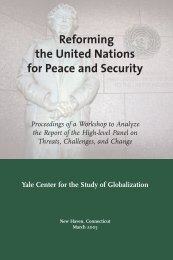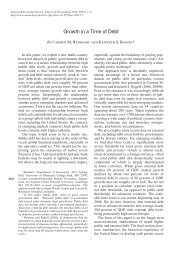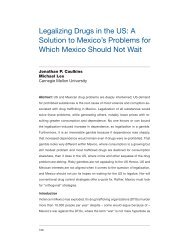The collapse of global trade, murky protectionism, and the crisis:
The collapse of global trade, murky protectionism, and the crisis:
The collapse of global trade, murky protectionism, and the crisis:
Create successful ePaper yourself
Turn your PDF publications into a flip-book with our unique Google optimized e-Paper software.
18. Resist green <strong>protectionism</strong> – or pay <strong>the</strong><br />
price at Copenhagen<br />
Simon J. Evenett <strong>and</strong> John Whalley<br />
University <strong>of</strong> St. Gallen <strong>and</strong> CEPR; CIGI <strong>and</strong> University <strong>of</strong><br />
Western Ontario<br />
This year was supposed to see breakthroughs in <strong>global</strong> environmental policymaking,<br />
<strong>and</strong> that may still come to pass. However, <strong>the</strong> severity <strong>of</strong> <strong>the</strong> <strong>global</strong> economic downturn<br />
is intensifying protectionist pressures <strong>and</strong> fears <strong>of</strong> a resurgence <strong>of</strong> green <strong>protectionism</strong>.<br />
Green <strong>protectionism</strong> could undermine <strong>the</strong> collaborative spirit needed to find solutions<br />
to systemic environmental threats, such as climate change. Policymakers <strong>and</strong><br />
opinion leaders in industrialised countries need to appreciate that <strong>the</strong>ir ambitions for<br />
<strong>global</strong> environmental reform will be frustrated if <strong>the</strong>y do not successfully resist green<br />
<strong>protectionism</strong> during <strong>the</strong> <strong>crisis</strong>. Trading partners in <strong>the</strong> rest <strong>of</strong> <strong>the</strong> world will hardly<br />
believe that <strong>the</strong> discretion abused in existing national environmental regulation<br />
won't be abused again when border tax adjustments, carbon taxes, or permit allocation<br />
schemes are implemented to mitigate climate change. <strong>The</strong> much-vaunted goals<br />
<strong>of</strong> Western policymakers for climate change will be jeopardised if <strong>the</strong>y indulge in<br />
<strong>murky</strong>, green <strong>protectionism</strong> now.<br />
Concerning <strong>the</strong> environment, 2009 was supposed to be a year <strong>of</strong><br />
great promise<br />
<strong>The</strong> election <strong>of</strong> a new US President saw a new Administration take <strong>of</strong>fice in January<br />
2009 that is keen on multilateral approaches to addressing climate change. This constitutes<br />
a major shift in American policy stance <strong>and</strong> effectively isolates <strong>the</strong> few<br />
remaining industrialised countries holding out against bold climate change measures.<br />
Since taking <strong>of</strong>fice <strong>the</strong>re have been no signs that <strong>the</strong> Obama Administration is backing<br />
away from its campaign pledges, indeed last week saw newspaper articles confirming<br />
<strong>the</strong> White House's intention to press ahead with <strong>the</strong>se matters.<br />
<strong>The</strong>se developments in <strong>the</strong> US take on particular significance given <strong>the</strong> scheduled<br />
December 2009 Copenhagen negotiation on a replacement for <strong>the</strong> Kyoto Protocol on<br />
climate change – an accord that could come into effect in 2012. Even before <strong>the</strong> <strong>global</strong><br />
economic downturn, negotiations on climate change-related emissions caps have<br />
proved contentious. Unlike <strong>the</strong> Kyoto Protocol, where developing countries did not<br />
make emission-related commitments, a maintained assumption in <strong>the</strong> current negotiation<br />
is that all countries – in particular <strong>the</strong> fast growing large emerging markets –<br />
need to make binding commitments if <strong>the</strong>re is any hope <strong>of</strong> limiting long-term climate<br />
change.<br />
While <strong>the</strong> principle <strong>of</strong> "common but differentiated responsibilities" has been<br />
accepted in <strong>the</strong> current climate change negotiations, implying that developing countries<br />
would shoulder less <strong>of</strong> <strong>the</strong> burden associated with mitigating climate change, <strong>the</strong><br />
93





